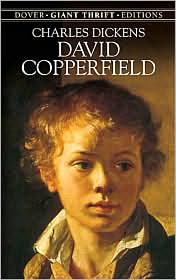Sunday, May 29, 2011
David Copperfield
I finished David Copperfield last week. It was Dickens's favorite of all his novels and considered the most autobiographical work he had ever produced. This was the first Dickens novel to be narrated in the first person and would pave the way for my favorite of his novels, Great Expectations, also in first person. This is Freud's favorite novel. I'm not entirely sure what to make of that, but I know it's indicative of something. The completion of David Copperfield is part of a larger project I have undertaken. Almost two years ago, I purchased the collected works of Charles Dickens, the goal being to read every word he ever wrote. Growing up, I read Great Expectations, A Tale of Two Cities, Oliver Twist, and A Christmas Carol. Earlier this year, I read Bleak House, which I loved.
I first encountered David Copperfield when I was three years old and in a very circumvented way. In fact, I was completely unaware that I had encountered Dickens at all; it was not until many years later that I even realized that I had undergone such an early exposure. My mother made the ultimately life shaping decision of letting me watch Gone With the Wind at the tender age of three, thereby ensuring a lifelong preoccupation with the subject and a bit of melodrama that no amount of efforts in humility could break. (Neither here nor there when it comes to Copperfield.) During the scene when Scarlett's second husband Frank Kennedy and Ashley were going through the shanty town to find the man who had earlier attempted to attack her and to "clear it out," Scarlett, Melanie, and a host of other ladies sat around sewing and pretending that their husbands were at a "political meeting." Melanie decided to read. I will never forget the sound of her voice, "Chapter One, I am born. . ." And a few chapters later "I passed a memorable birthday. . ." And upon the banging on the door, "I remember nothing. . ." What book was she reading? Why, David Copperfield! Twenty-six years after first encountering the scene, I encountered the words on the page when I opened one of Dickens's most famous works. And I was not disappointed.
Entirely random and (I'm afraid) not particularly profound thoughts upon the completion of Charles Dickens's David Copperfield:
* Dickens routinely outdoes himself in the amazing characters he creates. This book was no exception. From the no-nonsense, high strung, amazingly liberated aunt Betsy Trotwood screaming at donkeys while chasing them with brooms to the bombastic, forever insolvent, and absolutely hilarious Mr. Micawber---I can't begin to describe the characters. Each character would warrant pages of explanation. They are so developed, so unique, yet so universally sympathetic at the same time. And of course, he always gives some of the best names. Obviously a man named Uriah Heep was born to be a villain.
*I have never encountered a more favorable---in fact jubilant account---of being forced into circumstances that warranted a relocation to the penal colony of Australia.
*David's nurse, Peggoty, stands as one of the most beloved, nurturing characters in all of literature, while still managing to be comical.
*How convenient that Dora dies so that David could be with the woman he was truly meant to marry. How nice to be able to kill off young, naive first wives when it suits the plot.
*This novel actually features a dog named Jip who walks up and down the top of the dinner table---as in between the plates---and lives in a doghouse made to resemble a Chinese pagoda. This dog also curiously meets its demise simultaneously as his mistress does (one of the only disappointing moments of over sentimentality on Dickens's part).
*Copperfield's best friend and sidekick, Traddles, could possibly cause one to laugh out loud, particularly towards the end of the novel when he finally weds "the dearest girl of all" and then proceeds to spend their honeymoon catering to her nine sisters.
*When I read about David's travels, I long to see the cathedral in Canterbury and the cliffs of Dover, not to mention St. Paul's as is featured on Peggoty's sewing kit.
*I had no idea that rooks were birds. They were featured prominently in this text, and since learning this, I have encountered references to rooks no less than 14 other times in other venues.
*How interesting that David's father marries a "child-wife" and that David goes on to initially do the same.
*The description of the forays of David's servants is laugh out loud funny. They blatantly steal from him, and yet David tells it as if it is all an inevitability and truly stemming from his own character flaws.
*Who wouldn't wish to be Agnes? Really?
*You feel for David, from the first page to the last. You pull for him every step of the way. I know how NOT post-modern it is and how lacking in sophistication it is for me to admit this, but I love a good hero you can get behind. David is most certainly that.
Labels:
Literature
Subscribe to:
Post Comments (Atom)




No comments:
Post a Comment